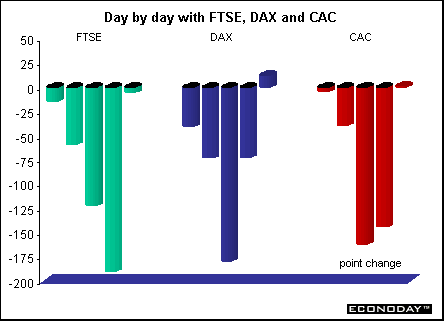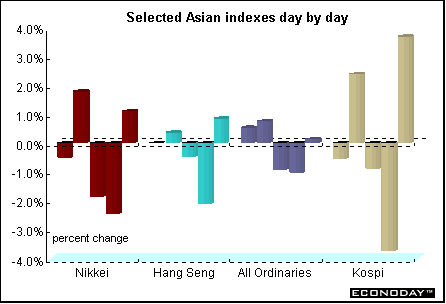 |

Europe and Britain
There didn't seem to be any good news in Europe or Britain to bolster investor confidence toward equities, which were sold, sold and then sold some more. The erosion in confidence led investors to sell not just the beleaguered stocks suffering from government scrutiny, but those who might be indirectly affected from drops in valuations such as insurance companies who rely on their investments for income. The London FTSE-100 dropped 8.5 percent, the CAC-40 in Paris fell 9.1 percent and the Frankfurt DAX sank 7.9 percent on the week.

When U.S. stock indexes fall, Asia and Europe usually follow. But Europe is living off a steady diet of its own bad news, too. In the past, the losses were centered in the TMT stocks - technology, media and telecommunications. But now financial stocks are also being hammered because investors had underestimated the risks of holding insurance and bank stocks. Insurers are being forced to sell stocks in order to meet regulatory requirements, while banks are holding souring loans. Insurers, whose capital has been eroding as share prices have fallen, are among the worst losers in Europe. There were signs that big investors such as pension funds, particularly in Britain, were being forced to sell shares into the declining market in order to meet financial stability requirements.
Many European firms are grappling with high debt loads, potentially hefty write-downs on the value of assets, and fuzzy profit outlooks. A number of European blue-chip companies are slated to report their second-quarter results during the next two weeks, sharpening the focus on company earnings. Investors are skeptical whether company officials will point to improving sales and profits.
Asia
After WorldCom revealed its troubles, the Nikkei 225 followed the Nasdaq down. However, as more revelations have surfaced, the response in Tokyo has diminished. Now the Nikkei appears to have split from the Nasdaq amid continuing fears in the U.S. of terrorist attacks, strong pressure on the dollar, and the string of accounting scandals. Analysts say that the troubles in the United States are causing investors to re-examine both Japanese and U.S. economic fundamentals in their search for buying signals. They disagree, however, where those signals lie and even whether there really is a decoupling. Some market watchers say the recent divergence in market movements is nothing more than investors shifting their weightings from the United States to Japan. This is despite the steady improvement in the U.S. economy.

Japanese capital flows in the week ending July 5 showed that Japanese investors were again net buyers of foreign equities and heavy buyers of foreign bonds. For the third straight week, foreign investors were again net sellers of Japanese equities and Japanese bonds.


Last Week's Highlights • Global Stock Market Indexes • Recap of Global Markets • Currencies • Indicator Scoreboard

The Bottom Line • Looking Ahead
|
 |
![[Back To Archive]](../../../images/backtoarchive.gif)